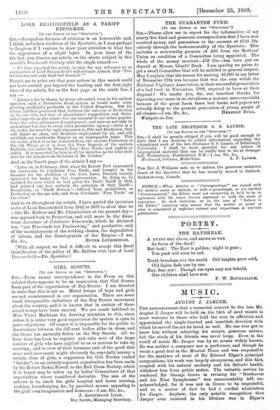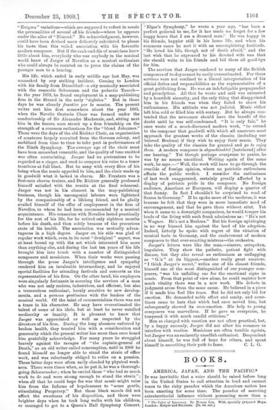MUSIC,
AUGUST J. JAEGER.
THE announcement that a memorial concert to the late Mr. August J. Jaeger will be held an the 24th of next month is most welcome to those who held the man in affection and appreciated the single-hearted and unselfish devotion with which he served the art he loved so well. No one ever got to know him without admiring his simple, generous nature, but the circle of his friends was never large. Even in the world of music Mr. Jaeger was by no means widely known. He was neither a composer nor a performer, and though he wrote a good deal in the Musical Times and was responsible for the analyses of most of Sir Edward Elgar's principal compositions, his work was largely anonymous, and this fact, coupled with his natural modesty and his delicate health, withdrew him from public notice. The valuable service he rendered Sir George Grove in revising his " Beethoven and his Nine Symphonies" was unaccountably left un- acknowledged, for it was not in Grove to be ungrateful, and as a matter of fact he had a cordial admiration for Jaeger. Anyhow, the only notable recognition that Jaeger ever received in his lifetime was in Elgar's
"Enigma" variations—which are supposed to reflect in music the personalities of several of his friends—where he appears under the alias of " Nimrod." No acknowledgment, however, could have been devised more delicately calculated to please his taste than this veiled association with his favourite modern composer. But if the rank-and-file of musicians knew little about him, everybody who was anybody in the musical world knew of Jaeger of Novellos as a musical enthusiast who could always be counted on to press the claims of the younger men to a hearing.
His life, which ended in early middle age last May, was unmarked by any striking incident. Corning to London with his family from Diisseldorf—a city musically associated with the romantic Schumann and the pedantic Tausch- in the year 1878, he found employment in a map-publishing firm in the Strand in the early "eighties." But in those days he was already fanatico per la musica. The present writer met him first somewhere about the year 1885, when the Novelle Oratorio Choir was formed under the conductorship of Sir Alexander Mackenzie, and, sitting next him in the tenors, soon struck up a firm friendship on the strength of a common enthusiasm for the "blond Johannes." Those were the days of the old Richter Choir, an organisation of amateurs largely recruited from the German colony, and mobilised from time to time to take part in performances of the Ninth Symphony. The average age of the choir must have been somewhat venerable, and the quality of tone emitted was often excruciating. Jaeger had no pretensions to be regarded as a singer, and used to compare his voice to a tenor trombone at full blast. But he sang with every fibre of his being when the music appealed to him, and the choir made up in goodwill what it lacked in charm. Mr. Frantzen was a first-rate chorus trainer, and Dr. Richter generally professed himself satisfied with the results at the final rehearsal. Jaeger was not in his element in the map-publishing business, though his uncongenial labours were lightened by the companionship of a lifelong friend, and he gladly availed himself of the offer of employment in the firm of Novellos, to whom he had been recommended by a musical acquaintance. His connexion with Novellos lasted practically for the rest of his life, for he retired only eighteen months before his death, and then solely because of the precarious state of his health. The association was mutnally advan- tageous in a high degree. Jaeger on his side was glad of regular work which, even in its most "-drudgical " aspect, was at least bound up with the art which interested him more than anything else, and during the last ten years of his life brought him into touch with a number of distinguished composers and musicians. When their works were passing through the press Jaeger's intelligence and sympathy rendered him an invaluable intermediary, and he enjoyed special facilities for attending festivals and concerts as the representative of his firm. On the other hand, his employers were singularly fortunate in securing the services of a man who was not only zealous, industrious, and efficient, but also a tremendous enthusiast, keenly sensitive to new develop- ments, and a persona gratissima with the leaders of the musical world. Of the taint of commercialism there was not a trace in his character. He may have overestimated the talent of some of his idols, but at least he never extolled mediocrity or inanity. It is pleasant to know that Jaeger was appreciated as well as respected by the directors of his firm. During the long absences enforced by broken health, they treated him with a consideration and generosity which the present writer has more than once heard him gratefully acknowledge. For many years he struggled bravely against the ravages of " the captain-general of Death," as an old writer called consumption, until in 1908 he found himself no longer able to stand the strain of office work, and was reluctantly obliged to retire on a pension. These latter days were often sadly clouded by physical weak- ness. There were times when, as he put it, he was a thorough- going. Schwarzseher ; when he envied those " who had so much work to do and were strong enough to stand the strain" ; when all that he could hope for was that music might raise him from the 'inferno of hopelessness to "some gentle, stimulating Purgatory." Bat these black moods did not affect the sweetness of his disposition, and there were brighter days when he took long walks with his children, or managed to get to a Queen's Hall Symphony Concert.
Elgar's Symphony," he wrote a year ago, " has been a perfect godsend to me, for it has made me forget for a few happy hours that I am a doomed man." He was happy in his friends, happier still in his home life, and when his summons came he met it with an uncomplaining fortitude. " He loved his life, though not of death afraid," and the last wish that he expressed to his devoted wife was that she should write to his friends and bid them all good-bye for him.
The services that Jaeger rendered to many of the British composers of to-daycannot be easily overestimated. For these services were not confined to a liberal interpretation of his official duties and responsibilities as the representative of a great publishing firm. He was an indefatigable propagandist and proselytiser. All that he wrote and said was animated by a heartfelt sincerity, and the only thing that disappointed him in his friends was when they failed to share his enthusiasms. His attitude was not judicial. Music either left him cold or filled him with ecstasy. But he always con- tended that the newcomer should have the benefit of the doubt until he was self-condemned. " It is only fair," he once wrote of a much-discussed modern work, " to extend to the composer that goodwill with which all amateurs must approach the greatest works of the classics (including our beloved Brahma) if they wish to enjoy their music. They take the quality of the classics for granted and go to enjoy them. A modern composer is abgesch.lachtet [butchered] after one hearing." Yet though perhaps overprone to praise, he was by no means uncriticaL Writing again of the same work, he says :—" Well, the work will have to go through the crucible of foreign opinion, where no patriotic enthusiasm affects the public verdict. I consider the enthusiasm of last week exaggerated, certainly greatly affected by a display of patriotic pride in the composer. No foreign audience, American or European, will display a quarter of that frenzy. In fact I shouldn't be surprised to read of fiascos in Germany." If he spoke more of the moderns, it was because he felt that they were in more immediate need of encouragement, and that he gave them without stint. Yet when it came to a downright comparison, he would temper his lands of the living with such frank admissions as : " He's not a Wagner. He's not a Brahms." But his foreign upbringing hi no way biassed him against the land of his adoption. Indeed, latterly he spoke with regret of the vitiation of musical taste in Germany, and the enslavement of modern composers to that over-exacting mistress—the orchestra.
Jaeger's letters were like the man,—sincere, outspoken, impulsive. They show the pathetic, patient fight with disease, but they also reveal an enthusiasm as unflagging as " G.'s " at its biggest,—another really great amateur. " I think Jaeger's secret," writes one of his closest friends, himself one of the most distinguished of our younger com- posers, "was his unfailing ear for the emotional signs in music. From that point of view alone, he could register how much vitality there was in a new work. His defects in judgment arose from the same cause. He believed in a piece if it made him feel like tears. But he did not only bid for emotion. He demanded noble effort and sanity, and some- times came to hate that which had once moved him, but subsequently showed its over-emotion. His help to young composers was marvellous. If he gave us overpraise, he tempered it with much candid criticism."
Men so charged with emotion are not often practical, but, by a happy anomaly, Jaeger did not allow his romance to interfere with routine. Musicians are often terrible egoists, but Jaeger was an eminently unselfish enthusiast. Despondent about himself, he was full of hope for others, and spent himself in smoothing their path to fame. C. L. G.



































 Previous page
Previous page